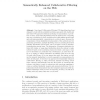Free Online Productivity Tools
i2Speak
i2Symbol
i2OCR
iTex2Img
iWeb2Print
iWeb2Shot
i2Type
iPdf2Split
iPdf2Merge
i2Bopomofo
i2Arabic
i2Style
i2Image
i2PDF
iLatex2Rtf
Sci2ools
120
click to vote
EWMF
2003
Springer
2003
Springer
Semantically Enhanced Collaborative Filtering on the Web
Item-based Collaborative Filtering (CF) algorithms have been designed to deal with the scalability problems associated with traditional user-based CF approaches without sacrificing recommendation or prediction accuracy. Item-based algorithms avoid the bottleneck in computing user-user correlations by first considering the relationships among items and performing similarity computations in a reduced space. Because the computation of item similarities is independent of the methods used for generating predictions, multiple knowledge sources, including structured semantic information about items, can be brought to bear in determining similarities among items. The integration of semantic similarities for items with rating- or usage-based similarities allows the system to make inferences based on the underlying reasons for which a user may or may not be interested in a particular item. Furthermore, in cases where little or no rating (or usage) information is available (such as in the case ...
Related Content
| Added | 06 Jul 2010 |
| Updated | 06 Jul 2010 |
| Type | Conference |
| Year | 2003 |
| Where | EWMF |
| Authors | Bamshad Mobasher, Xin Jin, Yanzan Zhou |
Comments (0)

